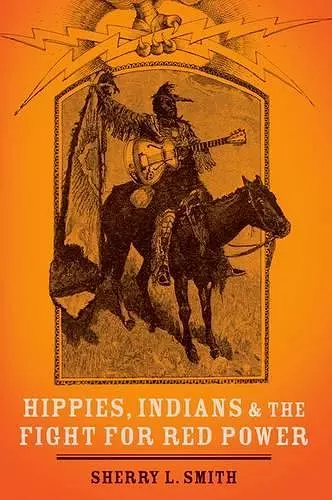Hippies, Indians, and the Fight for Red Power
Format:Paperback
Publisher:Oxford University Press Inc
Published:23rd Oct '14
Currently unavailable, and unfortunately no date known when it will be back
This paperback is available in another edition too:
- Hardback£47.99(9780199855599)

Through much of the 20th century, federal policy toward Indians sought to extinguish all remnants of native life and culture. That policy was dramatically confronted in the late 1960s when a loose coalition of hippies, civil rights advocates, Black Panthers, unions, Mexican-Americans, Quakers and other Christians, celebrities, and others joined with Red Power activists to fight for Indian rights. In Hippies, Indians and the Fight for Red Power, Sherry Smith offers the first full account of this remarkable story. Hippies were among the first non-Indians of the post-World War II generation to seek contact with Native Americans. The counterculture saw Indians as genuine holdouts against conformity, inherently spiritual, ecological, tribal, communal-the original "long hairs." Searching for authenticity while trying to achieve social and political justice for minorities, progressives of various stripes and colors were soon drawn to the Indian cause. Black Panthers took part in Pacific Northwest fish-ins. Corky Gonzales' Mexican American Crusade for Justice provided supplies and support for the Wounded Knee occupation. Actor Marlon Brando and comedian Dick Gregory spoke about the problems Native Americans faced. For their part, Indians understood they could not achieve political change without help. Non-Indians had to be educated and enlisted. Smith shows how Indians found, among this hodge-podge of dissatisfied Americans, willing recruits to their campaign for recognition of treaty rights; realization of tribal power, sovereignty, and self-determination; and protection of reservations as cultural homelands. The coalition was ephemeral but significant, leading to political reforms that strengthened Indian sovereignty. Thoroughly researched and vividly written, this book not only illuminates this transformative historical moment but contributes greatly to our understanding about social movements.
In this remarkably insightful work, Sherry L. Smith brings to light a series of cross-cultural encounters during the Red Power era that until now have not been carefully parsed. ... Her persuasive analysis reveals example after example of meaningful cooperation and sincere mutual support. ... It is a bold and important retelling that should shape our discussions for years to come. * Western Historical Quarterly *
Smith's book is...a model of cross-racial negotiation. She sees her task as correcting the record on the makeup of Red Power politics without diminishing the leadership of 'the original American 'long hairs' or the costs borne by their communities. She...judiciously trac[es] the false starts and the achievements of co-operation. * Christine Bold, Times Literary Supplement *
Smith must be commended for opening a new door on the counterculture-Indian relationship. Smith's well written text substantially advances our understanding of the multiethnic nature of Native American activism in the 1960s and 1970s, and it both reveals and redeems the imaginings of Indianness by sixties hippies as important to that cause. * Current Anthropology *
Elegantly written and thoroughly documented Smith does an excellent job of shedding light not only on the complicated relations between Indians and non-Indians but also on the nuances within Indian America, particularly among various Red Power movements, more established organizations like the National Congress of American Indians, and reservation-based tribal governments. * Akim D. Reinhardt, American Historical Review *
An outstanding book.... Smith has written one of the very best histories of 'Red Power'. ... Her account of how Indian activists fought for greater sovereignty and control over their lands and their collective lives by attracting outside support and forging alliances with nonIndians is a moving and thought-provoking tale. ... Her method in analyzing the Red Power movement is innovative.... An exemplary account of a major sixties-era social change movement that can serve as a conceptual model. * H-Net Reviews *
A convincing, concise, and readable introduction to a topic with which many readers may be unfamiliar. * CHOICE *
If ever there was a story difficult to get right, it's the turbulent confluence of hippies and American Indians in the 1960s and 70s. Sherry Smith gets it right. * Stewart Brand, author of Whole Earth Discipline *
With penetrating analysis, Sherry Smith argues eloquently that the 1960s and 1970s were the defining moment in modern political history for America and American Indians struggling for justice. This book defines this pivotal time; it contextualizes nationwide political activism by putting an odd couple - Indians and hippies together - on the center stage of making history. Absolutely brilliant! * Donald L. Fixico, author of The Urban Indian Experience in America *
Sherry Smith has done a masterful job of sorting out the braided cultural strains which tangled and interpenetrated during the cultural and political revolutions of the Sixties. I was present at a number of these events, knew many of the players, and am amazed at the way she has clarified 'the fog of war,' which is how history recounted appears to participants. Her book covers an unacknowledged aspect of Native people's struggle for justice and the confusing, often ignorant manner in which counter-culture hipsters, liberals, and well-meaning do-gooders tried to 'help' them. Through it all, 'White' cultural assumptions loom as large as a rude and noisy guest at a prayer breakfast. It's eye-opening, ground-breaking work and deserves to be read. * Peter Coyote, actor and author of Sleeping Where I Fall *
Without ever losing sight of the larger tragedy of American Indian history, Sherry Smith writes deftly and often wryly of the 1960s and 1970s when the counterculture and the New Left discovered Indians, and Indians discovered the political possibilities that alienated young white Americans presented. The results were sometimes comic, sometimes painful, occasionally touching, but always revealing of the changing valence of Indian peoples and cultures in American society and American politics. This is an original and absorbing book. * Richard White, Stanford University *
ISBN: 9780190217853
Dimensions: 231mm x 155mm x 18mm
Weight: 408g
282 pages